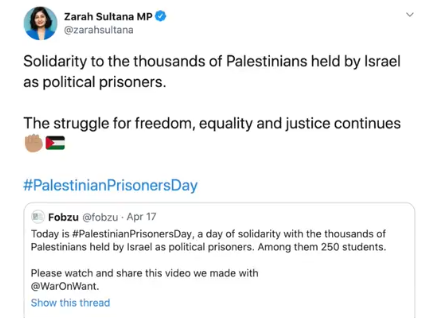Peter Tatchell says:
The London-based press watchdog, Arab Media Watch (AMW), has produced research demonstrating that British press reporting of the Middle East conflict has massively favoured the Israeli Ambassador to the almost complete exclusion of the Palestinian Ambassador.
A statement released by Arab Media Watch “expresses concern at the frequent use by the British press of Israeli Ambassador Ron Prosor, compared with the near-total absence of his Palestinian counterpart Manuel Hassassian.”
AMW’s claim of bias is supported by London-based human rights campaigner Peter Tatchell:
“This research shows that the Israeli Ambassador has received 2,000% more UK national press coverage than his Palestinian opposite number, Ambassador Hassassian. Such bias does not give the British people a balanced perspective on the Israel-Palestine conflict and the tragic events in the Palestinian territories. The non-reportage of Mr Hassassian is particularly regrettable because he is a voice of Palestinian moderation, peace and constructive dialogue. By denying him coverage, the press is handing a propaganda victory to Israel and Hamas and allowing the hawks on both sides to dominate the public debate,” said Mr Tatchell.
According to AMW’s survey, from the time that Mr Prosor became Israeli Ambassador to the UK at the end of 2007 until the end of 2008, there have been 40 items (news articles, commentaries, editorials and letters) either by him, quoting him or mentioning him in British national newspapers.
In contrast, during the same period, Ambassador Hassassian has been mentioned only twice in the UK national press – both times in the Guardian, quoted in two articles by Middle East editor Ian Black. This is 20 times fewer mentions than Mr Prosor.
Mr Prosor has been reported in the following newspapers:
Newspaper No. of % of
Items ItemsDaily Telegraph 16 40
The Times 6 15
The Guardian 5 12.5
The Independent 5 12.5
Daily Mail 3 7.5
The Sun 1 2.5
Daily Mirror 1 2.5
Daily Star 1 2.5
News of the World 1 2.5
The Observer 1 2.5“For the sake of balance, this should be rectified, particularly given the importance of the Israeli-Palestinian conflict, the frequency with which it is reported, and the regular use of Prosor,” said AMW chairman Sharif Hikmat Nashashibi. Our findings call into question Prosor’s complaint in the Telegraph that ‘coverage of the Israeli-Palestinian conflict is routinely tainted with bias’ against his country. Prosor’s views are clearly and overwhelmingly more prevalent than his Palestinian counterpart.”
Nashashibi added:
“Hassassian is an able and eloquent spokesman who is readily available to the media. Making use of him would contribute to a sense of even-handedness in British press coverage, which would benefit readers.”
AMW expresses particular concern over the coverage by the Telegraph, not just because of the frequent platform it provides Mr Prosor, but because AMW has been writing to the newspaper since July 2008 requesting an explanation for the total absence of Hassassian in its pages. We have yet to receive a reply, though we have been promised one three times.
Here is a breakdown of the national press coverage of the Israeli Ambassador
Mr Prosor has authored six commentaries:
– three in the Telegraph
– two in the Guardian
– one in the SunA further four commentaries quoted him: three in the Telegraph (two by Con Coughlin, one by David Hughes), one in the Times (Hugo Rifkind)
Mr Prosor was quoted in 18 news articles: six in the Telegraph (including by Martin Beckford, Tim Butcher,
Duncan Gardham and Con Coughlin), four in the Times (James Hider and Richard Beeston), three in the Independent (two by Donald Macintyre, one by Ian Johnston), one each in the Mail (Liz Thomas), Guardian (Toni O’Loughlin), Daily Mirror (Andrew Gregory), Daily Star (anonymous) and Observer (David Hills)He was mentioned in a further 10 news articles: two each in the Telegraph (Charlotte Bailey and Tom Peterkin),
the Mail (Alex Brummer and anonymous), Guardian (Rory McCarthy and Toni O’Loughlin) the Independent (Ian Herbert, Andy McSmith and Mark Hughes), and once each in the Times (Ruth Gledhill) and News of the World (anonymous)The Telegraph also published a letter by Prosor, and an editorial mentioning him.
This one-sided coverage of the Israeli Ambassador to the exclusion of the Palestinian Ambassador is evidence of partisanship, which does not ensure balance, understanding or progress towards a solution to the Middle East conflict.
My thoughts are as follows.
First of all, as anybody who works in PR will know, the frequency with which a prominent person appears in a newspaper is directly proportional to the effort that a person put into getting themselves into print. If the Palestinian Ambassador isn’t appearing in print, the most likely explanation is either that he is no good at punting himself around news organisations, or that he is keeping a low profile.
One reason that the Ambassador might be keeping a low profile, since the Hamas coup, and particularly since the start of the Gaza conflict, is that there are a number of questions that would inevitably be asked by a journalist, that a sensible Fatah aligned diplomat might not want asked. He might well want to avoid questions – particularly during the Fatah-Hamas unity negotiations – that would have highlighted the depth of the split between the two parties, and the subsequent civil war in which many Palestinians were killed, and Fatah activists repressed and defeated. I can understand perfectly why he might wish to avoid washing his country’s dirty linen in public.
It is also no secret that Fatah has, at the very least, mixed emotions at the destruction visited upon its enemies, Hamas, accompanied as it is by the deaths of many unaligned and wholly innocent Palestinians in Gaza. Pretty much anything he might say would be seized upon by Hamas, and used against the Palestinian authority.
The Palestinian Authority is also essentially a bystander in this conflict. It isn’t firing missiles. It isn’t even in control of the Gaza strip. Why would the Palestinian Ambassador want to demonstrate its marginality, by press exposure that highlighted its impotence, at this time.
I suspect that Arab Media Watch knows all this too.


